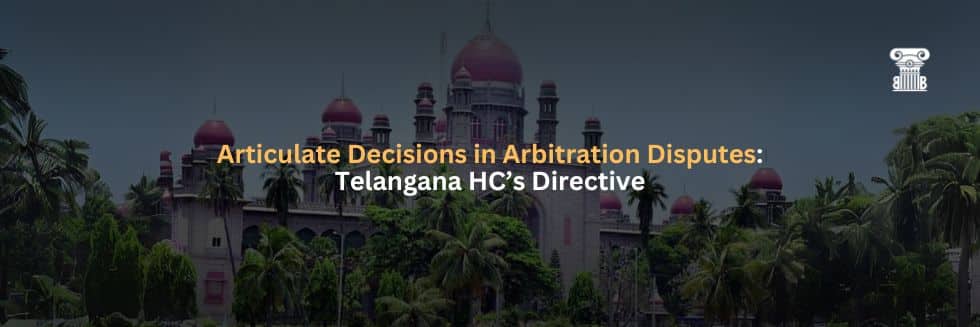In a recent case before the Calcutta High Court, BGM and M-RPL-JMCT (JV) v. Eastern Coalfields Limited, the court underscored the imperative of clarity in arbitration agreements. Justice Moushumi Bhattacharya presiding over a single bench dismissed a plea seeking arbitrator appointment emphasizing that the use of terms like “may” in arbitration clauses as observed in Clause 13 of the General Terms & Conditions fails to provide an explicit intent to arbitrate. The court held that such ambiguous language does not amount to an unequivocal commitment to arbitration reinforcing the importance of precision in expressing the parties’ arbitration intent.
CASE DETAILS:
BGM and M-RPL-JMCT (JV) v. Eastern Coalfields Limited
Case No: AP 745 of 2023
Calcutta High Court
Coram: Justice Moushumi Bhattacharya
BRIEF FACTS:
• The petitioner approached the court seeking the appointment of an arbitrator relying on Clause 13 of the General Terms & Conditions (GCC) in an e-Tender notice from 2019 by Eastern Coalfields Limited (ECL).
• This notice pertained to the removal and transportation of material for a project at Nakrakonda-Kumardih.
• The dispute arising from the petitioner’s role as a contractor reportedly centred around disagreements on changes made to the contract’s price component.
• The respondent’s counsel questioned the plea’s maintainability, contending that Clause 13 did not qualify as an arbitration agreement.
OBSERVATIONS:
Upon examining the case records and evidence, the Court noted that according to the General Terms & Conditions (GCC), the parties were obligated to resolve disputes in two stages. The crucial question revolved around whether the term “may” in Clause 13 constituted an arbitration agreement under Section 7 of the 1996 Act.
The Court relying on the Supreme Court judgment in Jagdish Chander v. Ramesh Chander (2007) emphasized that parties must explicitly express their intention to arbitrate in writing within the arbitration agreement. In this context, the Court held that the vague reference of “may” in Clause 13 did not unequivocally demonstrate the parties’ intent to arbitrate. Considering the nature of Section 11, the Court emphasized that appointing an arbitrator presupposes the existence of a valid arbitration clause. However, with the presence of a vague reference in Clause 13, the Court concluded that there was uncertainty regarding the parties’ intention to arbitrate.
Moreover, it was noted that the respondent had raised the absence of the arbitration agreement before the Commercial Court and a coordinate division bench. The Court found no additional circumstances such as correspondence indicating the parties’ intent to refer the dispute to arbitration. Consequently, the Court determined that Clause 13 of the GCC did not constitute an arbitration agreement. However, it assured the petitioner of an alternative remedy under Clause 32 which allowed approaching the jurisdictional court in case of grievances.
JUDGEMENT:
The Calcutta High Court emphasized that parties entering into an arbitration agreement must unambiguously express their intention to arbitrate without any ambiguity or uncertainty. Justice Moushumi Bhattacharya presiding over a single bench dismissed the plea seeking the appointment of an arbitrator under Section 11 of the Arbitration & Conciliation Act, 1996.
The court underscored that Section 11 of the 1996 Act serves as an early intervention by the court presuming the existence of an arbitration clause. However, the court clarified that it must ensure the existence of a clear arbitration agreement before proceeding with the arbitration process. In this case, the use of the term “may” in the relevant clause introduced ambiguity allowing the parties the option to either refer the dispute to arbitration or refrain from doing so making the clause conditional on future events. The court concluded that such conditional language did not constitute an immediate and unequivocal reference to arbitration.






